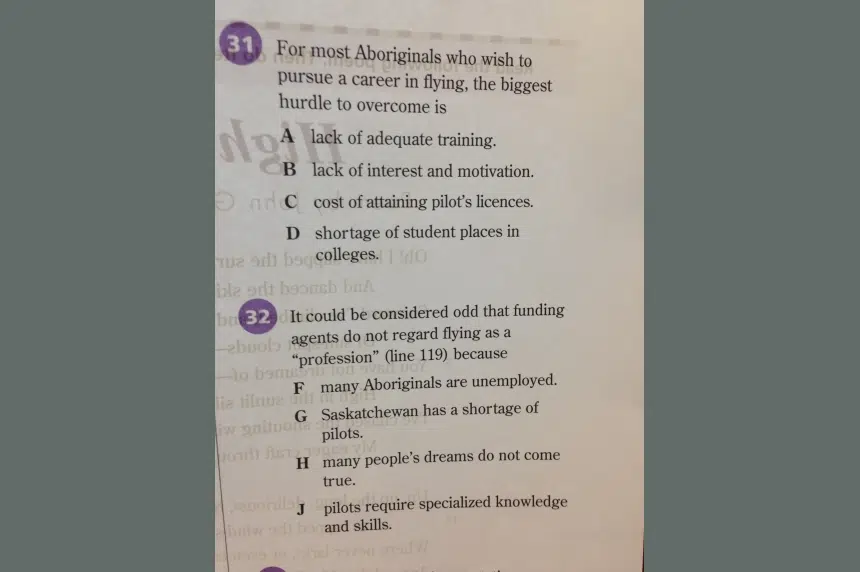A standardized test that went out to classrooms across the country will be changing after a student in Saskatoon noticed that some of the options in multiple choice questions included negative stereotypes about aboriginal people.
The exam recently administered to Saskatoon Public School (SPS) Grade 10 students included two questions “where the available multiple-choice options included two incorrect answers which were negative stereotypes about aboriginal people,” according to SPS spokesman Rod Drabble.
The questions alluded to aboriginal people having a “lack of interest and motivation” and that “many aboriginals are unemployed”.
A student writing the exam told their parent and it was brought to the attention of the school board and the division administrators were also concerned with the Level 19 test book of the Canadian Achievement Tests, Fourth Edition (CAT4).
“SPS has put a halt to administering that particular sub-test until further notice and contacted the Canadian Test Centre, which developed the test, for more information,” Drabble said in an emailed statement.
“The Canadian Test Centre is taking the concern very seriously and is moving to remedy the situation by re-writing the questions and providing the school division with new test booklets. The old booklets will be shredded.”
Director of operations for the Canadian Test Centre David Galati explained this particular edition of the test was published in 2008 and was field tested and normed in classrooms across Canada. It has been used by SPS since 2012.
“I was surprised and disappointed to see that our internal review of test items during the development of CAT4 did not identify these two test items and replace them before publication,” Galati said in an email.
“I was surprised and disappointed to see that our internal review of test items during the development of CAT4 did not identify these two test items and replace them before publication.” – David Galati
“This is the first time anyone has brought this concern to my attention, but Level 19 is not as widely used as our other test levels.”
Indian Teacher Education Program (ITEP) director Chris Scribe said he remembers facing stereotypes within his curriculum when he went to school but was shocked to see that it was still being spread across the country.
“I’m a First Nations person myself and I’m thinking what year is this?” he asked.
“I’m a First Nations person myself and I’m thinking what year is this?” – Chris Scribe
“Why are questions like this included on there? Why wasn’t it a question about a First Nation doctor and the need (for more doctors) or a success story of that? What is the purpose of having it where they are talking about non-motivation and talking about unemployment and they are talking about lack of funding? It’s like ‘wow’ this is still happening in our schools. That was the initial thought.”
Scribe said that subversive racism speaks to a need across the country for more action on indigenous inclusion in the curriculum.
“If we look at the history of education in regards to First Nation people in Canada it hasn’t been a very positive one. We know from the Truth and Reconciliation report and of the steps (in it) that we need to take to fix and mend situations like this from happening in our education system,” he said.
“It’s still there that this system of education was not intended for indigenous people to succeed… It makes it difficult for our students to really be proud of who they are and sit in a Canadian test which is administered nationally and think ‘I’m proud of who I am’ when they are reading things like this.”
Through his role at ITEP, Scribe has worked with both school boards in the city and says there is a lot of good work happening. He pointed to the provincial mandate that First Nations content be included in all subject areas and curriculum but said “we are just scratching the surface on reconciliation.”
“Our whole intent of an education system is to create citizens that are going to do good for our communities… But it’s the time now where we have to do that with the inclusion of indigenous knowledge, we have to do that in our school system that embodies the First Peoples of this land,” he said.
“We have the changing. But still somehow it made it through the filters of the CAT testing. Whoever looks at that, they thought it was okay to include, that’s wrong. But at least now we are having conversations to change things.”
Scribe said he encouraged that a student was able to identify that “these types of things have no place in our school divisions, have no place in our schools” and also by how quickly SPS responded to the concern.
“It wasn’t long ago that students wouldn’t bring this up and also for the SPS board to take steps to say, ‘No. We aren’t going to administer this until something is done’. Those are good steps,” he said.
“It’s so good to have our young people stepping up and saying ‘this is wrong and it needs to change’ because that truly is where change is going to happen in our country and province, is in our schools.”











